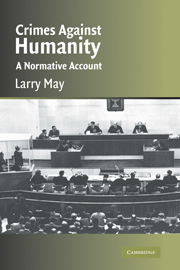Book contents
- Frontmatter
- Contents
- Acknowledgments
- A UNIVERSAL NORMS AND MORAL MINIMALISM
- B PRINCIPLES OF INTERNATIONAL CRIMINAL LAW
- 4 The Security Principle
- 5 The International Harm Principle
- 6 International Crime: The Case of Rape
- C PROSECUTING INTERNATIONAL CRIMES
- D DEFENSES AND ALTERNATIVES
- Conclusions
- Notes
- Bibliography
- Index
6 - International Crime: The Case of Rape
Published online by Cambridge University Press: 23 November 2009
- Frontmatter
- Contents
- Acknowledgments
- A UNIVERSAL NORMS AND MORAL MINIMALISM
- B PRINCIPLES OF INTERNATIONAL CRIMINAL LAW
- 4 The Security Principle
- 5 The International Harm Principle
- 6 International Crime: The Case of Rape
- C PROSECUTING INTERNATIONAL CRIMES
- D DEFENSES AND ALTERNATIVES
- Conclusions
- Notes
- Bibliography
- Index
Summary
International criminal law is currently faced with a defining moment: how to understand the truly international character of certain kinds of crime while providing an expanded forum for the prosecution of many egregious harms in the world. In this chapter, I extend the arguments of the previous two chapters by considering a specific example, the crime of rape. I focus on the very difficult case of how rape and other forms of sexual violence, typically understood as paradigmatically individualized crimes, should be handled in international criminal law. In light of the discussion of the last two chapters, I argue that unless there has been a complete breakdown in the rule of law in a particular country, international tribunals should only be concerned with prosecuting individuals for rapes that are group-based in that the harms are directed against individuals because of their group memberships or where there is some kind of State (or State-like) involvement. I argue that isolated acts of rape should not normally be subject to international prosecution, but examples such as the “comfort women” of World War II, and recent examples of mass rape in Yugoslavia, would be properly prosecuted internationally.
Until very recently, most theorists of international law ignored the possibility that international tribunals could be used to prosecute rape. Perhaps because of critical reaction to this omission, some of these same theorists now consider rape a proper subject of international prosecution.
- Type
- Chapter
- Information
- Crimes against HumanityA Normative Account, pp. 96 - 112Publisher: Cambridge University PressPrint publication year: 2004

